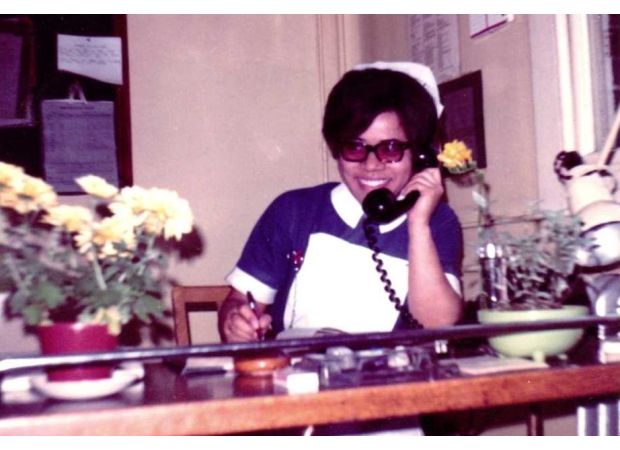A pioneering figure in Black British history who positively impacted countless individuals.
Encouraging others to embrace and openly share their personal experiences is my goal.

As I connect with Dame Elizabeth Anionwu over Google Meet, her warm smile and calm presence fill my screen. She greets me with a friendly remark about my being a twin, something that holds special meaning to me as a person of Yoruba culture. In my culture, twins are given specific names and I am named Kehinde, which denotes the younger of the two. Instantly, I feel a connection with Dame Elizabeth as she recognizes and acknowledges my heritage.
Dame Elizabeth's groundbreaking work as the UK's first sickle cell and thalassaemia nurse specialist is well-known, but it is her warmth and humility that truly shine through. Despite her impressive list of accolades, including being one of the few nurses to receive the Order of Merit, a CBE, and a Damehood, she remains deeply human. As we delve into her decades-long career of transforming healthcare for marginalized communities, her down-to-earth nature is evident.
Born to an Irish mother and a Nigerian Igbo father, Dame Elizabeth's early life was marked by challenges. She was raised in a Catholic children's home in Birmingham and her mother, who was the first in her family to attend university, had to leave her studies when Elizabeth was born. As a single mother in a conservative society, she faced immense strain. Eventually, she made the difficult decision to place Elizabeth in a Catholic children's home in Birmingham, called Nazareth House.
"My mother was in her second year at Cambridge doing a classics degree, and she dropped out to make a home for me," Dame Elizabeth explains. "I stayed in the children's home for nine years because that's how long it took for my mother to sort herself out."
Despite facing her own struggles, such as severe eczema and undiagnosed asthma, Dame Elizabeth was drawn to the field of nursing. As a child, she was inspired by a "white nun" who treated her eczema with compassion and humor. This experience shaped her career path and she knew from an early age that she wanted to become a nurse, like the nun who had left such a lasting impression on her.
Growing up as the only Black child in the children's home, Dame Elizabeth never met anyone who looked like her until she moved to London at the age of 18 to study nursing. This lack of representation fueled her dedication to uplifting others who shared her background. "As an adult, I got very interested in Black health issues, and that's what led to my interest in sickle cell anemia, for example," she reflects.
However, her focus on sickle cell anemia was just the beginning. As she delved deeper into the health disparities affecting the Black community, Dame Elizabeth's interest expanded to other pressing issues, such as access to quality healthcare and institutionalized racism within the NHS.
One of the most persistent challenges she faced was convincing those in positions of authority to recognize sickle cell disease as a serious health issue in the UK. She noticed a stark contrast between the physician-led approach to managing the disease in the UK and the significant role that nurses played in sickle cell care in the United States. This realization led her to pursue a more active role in sickle cell care, with the support of a consultant hematologist, Dr. Misha Brozovic.
Through her determination and perseverance, Dame Elizabeth helped establish the first nurse-led UK Sickle & Thalassaemia Screening and Counselling Centre in 1979. Her groundbreaking work has had a lasting impact on the healthcare system, and her legacy continues to inspire and uplift marginalized communities. As she looks back on her journey, she remains humble and deeply committed to making a positive difference in the lives of others.
Dame Elizabeth Anionwu, a remarkable nurse and an inspiring human being, has dedicated her life to exposing and addressing ethnic health inequalities within Britain. As we begin our conversation over Google Meet, her warm smile and calm presence fill my screen. I can't help but laugh as she correctly guesses that I am a twin, a fact that holds cultural significance for me as a Yoruba person. In Yoruba culture, twins are given special names, Taiwo and Kehinde, with Kehinde being traditionally given to the younger of the two. This recognition of my culture adds another layer of meaning to our interview.
Despite her groundbreaking work as the UK's first sickle cell and thalassaemia nurse specialist, Dame Elizabeth's warmth and humility are what truly shine through. As we discuss her decades-long career transforming healthcare for marginalized communities, she remains deeply human. She is one of the few nurses to be awarded the Order of Merit, a CBE, and a Damehood, and the only black nurse to hold all three accolades. But her story begins with humble yet complex roots.
Elizabeth Anionwu was born in Birmingham to an Irish mother and a Nigerian father. Her inspiration to become a nurse came from a "wonderful nursing nun" who treated her childhood eczema with sensitivity. However, her early life was marked by challenges as she was raised in a Catholic children's home. Her mother, the first in her family to attend university, had to leave her studies when Elizabeth was born and navigate single parenthood in a conservative society. Though her family never rejected her or Elizabeth, the strain was immense. With no partner to help, Elizabeth's mother made the difficult decision to place her daughter in a Catholic children's home in Birmingham.
"My mother was in her second year at Cambridge doing a classics degree, and she dropped out to make a home for me," Dame Elizabeth explains. "I stayed in the children's home for nine years because that's how long it took for my mother to sort herself out."
Dame Elizabeth's mother eventually married and Elizabeth moved in with her and her new husband in Wolverhampton. However, the stay was short-lived as her stepfather physically abused her because of her skin color. Elizabeth eventually went to live with her maternal grandparents. At the age of 16, she started working for the NHS as a school nurse assistant in Wolverhampton. And in 1979, she helped establish the first nurse-led UK Sickle & Thalassaemia Screening and Counselling Centre.
Despite facing her own struggles growing up, including severe eczema and undiagnosed asthma, it was a nun's compassion that shaped Dame Elizabeth's career decisions. "There was a nun I called the 'white nun' who used to make me laugh while changing my dressings," she remembers. "She used distraction therapy, and her care left such an impression on me. I knew from a very early age I wanted to be like her, but not a nun. I wanted to be a nurse."
The lack of representation in her formative years fueled her dedication to uplifting others who shared her background. She reflects, "I was the only Black child in the children's home, and I never met anybody who looked like me until I came to London at the age of 18 to study nursing." As she matured, her focus sharpened on the health disparities affecting the Black community. "As an adult, I got very interested in Black health issues, and that's what led to my interest in sickle cell anemia, for example," she explains.
But sickle cell anemia wasn't the only issue that caught her attention. Dame Elizabeth's interest expanded to other pressing health disparities affecting the Black community, particularly in relation to access to quality healthcare and institutionalized racism within the NHS. One of the most persistent challenges the young nurse faced was convincing those in positions of authority, both within the NHS and the government, to recognize sickle cell disease as a serious health issue in the UK.
It all began with her realization of the critical role nurses played in the care of sickle cell patients after learning from her brief trips to the United States. She noticed a stark contrast to the physician-led approach she had observed in the UK. "When I discussed this with Dr. Misha Brozovic, a consultant hematologist, I expressed my desire to get professionally involved with sickle cell care," she recalls.






